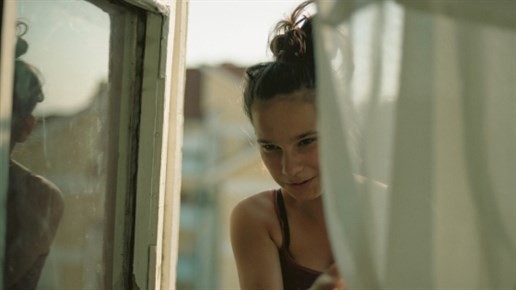Teodora Ana Mihai was born in 1981 in Bucharest, Romania, under Nicolae Ceausescu’s dictatorship. In 1989, she came to Belgium and was reunited with her parents, who had fled the year before. In junior high, the opportunity arose to study in California, where her aunt and her family had immigrated. Mihai completed the two last years of high school in San Francisco, while living at her aunt’s house. Soon enough — inspired by her father’s old passion for photography and the San Francisco artistic environment she ended up in — her wish to tell stories through images and sounds emerged.
Following her calling, she studied film at Sarah Lawrence College in upstate New York. Upon returning to Belgium, she first started working in the industry as a script supervisor and assistant director. However, the desire to work on her own projects grew so much that she decided to shift focus and dedicate herself entirely to this endeavor. With extra training as scriptwriter and the support of the Flemish Audiovisual Fund, she wrote the feature Little Lies (with co-writer Jean-Claude Van Rijckeghem) and directed the documentary Waiting for August. Her movies take on the challenge of striking a balance between social relevance and audio-visual poetry. (Press materials)
Waiting for August debuts at Hot Docs on April 29.
Please give us your description of the film.
First of all, I wanted to tell an immigration story because we usually never get to witness it. And of course, I was extremely inspired by my main characters, who are extremely resilient and courageous children.
What drew you to this story?
There are some distant similarities to my own childhood, so I felt very drawn to telling the story of Georgiana and her [five younger] siblings, who take care of themselves despite their fragile, young age.
What was the biggest challenge in making the film?
The films’ characters are almost exclusively children, and working with children is of course quite different than working with adults. They need special attention and care, but they give their all and more in return. I am grateful that they allowed me to enter their world.
What advice do you have for other female directors?
I don’t feel I am able to give any advice yet, since I consider myself at the beginning of my career. But the only advice that has helped me advance so far has been perseverance. I will keep following that advice in the future, as I truly love what I do and I hope to be able to go on for as long as possible.
What’s the biggest misconception about you and your work?
I am not sure there is any. It is too early for that. Let me just say that, being a woman director, I would not want to receive the label of making “women’s films.” I don’t think such a thing exists, actually, but I have heard people using the term. Anyway, I believe any artist prefers to appeal to as diverse an audience as possible. And a good story is just a good story, whether it is brought to the audience by a man or a woman. I just happen to be a woman, and I have stories to tell. And I am grateful I get to do so.
Do you have any thoughts on what are the biggest challenges and/or opportunities for the future with the changing distribution mechanisms for films?
Well, we will just have to keep reinventing ourselves to keep the Seventh Art alive. It is a beautiful challenge.
Name your favorite women directed film and why.
There are many titles and favorite films, so I prefer to abstain from giving examples, but I will just say that the director Agnieszka Holland is a source of inspiration for me. She is a powerful lady who is known to have found her way in this business and who directs wonderful projects (films as well as great TV series). I am lucky to have met her in person and to occasionally exchange emails. I find her advice and opinion always very valuable to my own development as a director.







